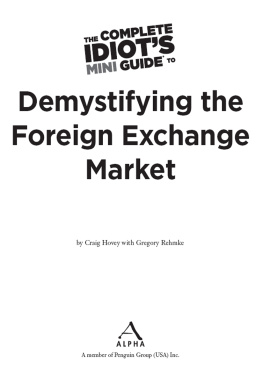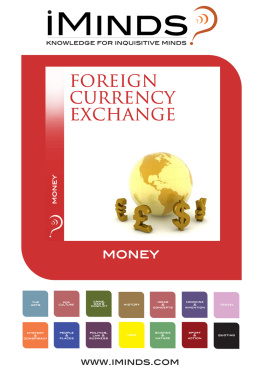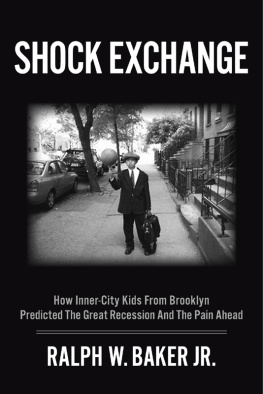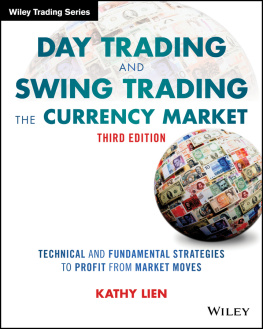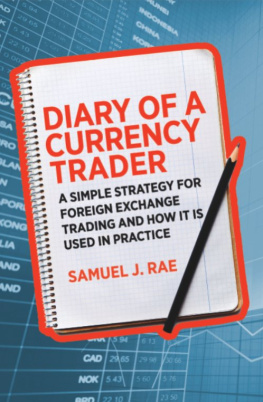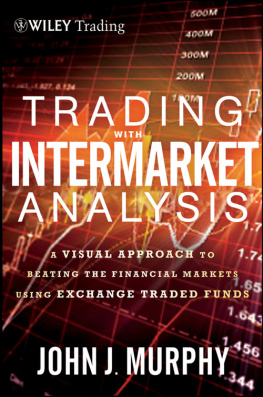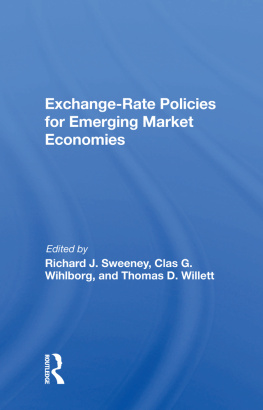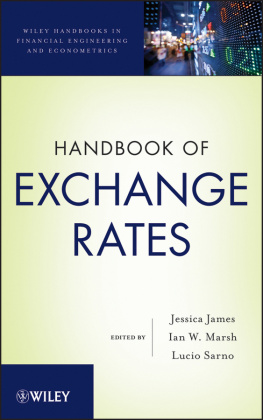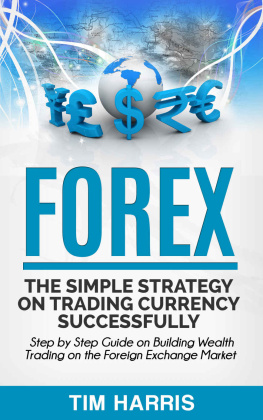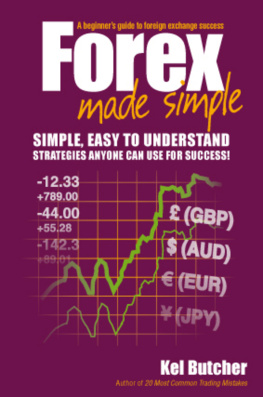THE COMPLETE IDIOTS MINI GUIDE TO Demystifying the Foreign Exchange Market
by Craig Hovey with Gregory Rehmke

ALPHA BOOKS
Published by the Penguin Group
Penguin Group (USA) Inc., 375 Hudson Street, New York, New York 10014, USA
Penguin Group (Canada), 90 Eglinton Avenue East, Suite 700, Toronto, Ontario M4P 2Y3, Canada (a division of Pearson Penguin Canada Inc.)
Penguin Books Ltd., 80 Strand, London WC2R 0RL, England
Penguin Ireland, 25 St. Stephens Green, Dublin 2, Ireland (a division of Penguin Books Ltd.)
Penguin Group (Australia), 250 Camberwell Road, Camberwell, Victoria 3124, Australia (a division of Pearson Australia Group Pty. Ltd.)
Penguin Books India Pvt. Ltd., 11 Community Centre, Panchsheel Park, New Delhi110 017, India
Penguin Group (NZ), 67 Apollo Drive, Rosedale, North Shore, Auckland 1311, New Zealand (a division of Pearson New Zealand Ltd.)
Penguin Books (South Africa) (Pty.) Ltd., 24 Sturdee Avenue, Rosebank, Johannesburg 2196, South Africa
Penguin Books Ltd., Registered Offices: 80 Strand, London WC2R 0RL, England
Copyright 2010 by Craig Hovey
Content excerpted from The Complete Idiots Guide to Global Economics, Copyright 2008 by Craig Hovey
All rights reserved. No part of this book shall be reproduced, stored in a retrieval system, or transmitted by any means, electronic, mechanical, photocopying, recording, or otherwise, without written permission from the publisher. No patent liability is assumed with respect to the use of the information contained herein. Although every precaution has been taken in the preparation of this book, the publisher and author assume no responsibility for errors or omissions. Neither is any liability assumed for damages resulting from the use of information contained herein. For information, address Alpha Books, 800 East 96th Street, Indianapolis, IN 46240.
THE COMPLETE IDIOTS GUIDE TO and Design are registered trademarks of Penguin Group (USA) Inc.
International Standard Book Number: 978-1-101-46323-9
Note: This publication contains the opinions and ideas of its author. It is intended to provide helpful and informative material on the subject matter covered. It is sold with the understanding that the author and publisher are not engaged in rendering professional services in the book. If the reader requires personal assistance or advice, a competent professional should be consulted.
The author and publisher specifically disclaim any responsibility for any liability, loss, or risk, personal or otherwise, which is incurred as a consequence, directly or indirectly, of the use and application of any of the contents of this book.
In This Mini Guide
A fascinating aspect of the global economy is the variety of currencies used by different nations. Be it a dollar, peso, euro, konar, franc, or yen, people want to buy goods and services with them. Not just goods and services produced at home, either, but a variety from around the world. And because one countrys currency is going to be used to buy products from other countries with different currencies, its necessary to have mechanisms in place for exchanging currencies.
With all of this exchanging going on, it can be confusing to try and figure out how the entire mechanism of the foreign exchange market works. In this guide we will show you how each aspect of the market works, from determining market forces and exchange rates, to speculating on exchange and having supply, demand, and equilibrium.
The Foreign Exchange Market Explained
To facilitate citizens, businesses, and governments from different countries trading with each other, foreign exchange markets developed. These markets exist wherever foreign currencies and debt instruments are bought and sold. Only a small portion of exchanges involve actual currency itselfmostly just the paper and coins you carry around in your pockets and purses. Most of what goes on is the transfer of bank deposits. The worlds major banks keep inventories of foreign exchange on hand in their branches and correspondent banks in many different countries and make it available for purchase.
Large and Liquid
There is no economic market that compares with foreign exchange in size. Worldwide, daily foreign exchange transactions top an average of $1.5 trillion. Single trades can be in the hundreds of millions of dollars. Because these markets are interconnected electronically, and so much money is involved, prices of different currencies are changing constantly, sometimes as often as 25 times in a single minute.
Not all currencies are for sale in foreign exchange markets (though most are). If a country, usually small, does not produce things other parties want, then there is no point in keeping their currency on hand. In addition, factors such as political upheaval and bad economic times cause other members of the global community to shy away from a particular currency. You can see why, then, any country seeking acceptance as a trading member of the global economy has a strong incentive to get its house in order.
The foreign exchange market is dispersed. There is no mandated structure, organization, or central authority that operates it as there is for stock exchanges. Nor are there limits on where the market operates or the currencies available (or not available). The foreign exchange market, then, exists wherever currencies are being traded, with the worlds biggest exchanges located in New York, London, and Tokyo, and also large ones in places such as Frankfurt and Chicago. Given the differences in time zones, its possible to find an exchange open for business almost anytime, day or night. So if you get a yen for a franc during the night, you can probably find a place to satisfy it!
When Argentinas government closed down banks in 2002 and halted formal convertibility from the Argentine peso to the dollar, currency markets moved out into the streets. Walking along certain downtown streets, you would hear quiet voices calling Cambio, cambio (Swap, swap in Spanish). Closing formal currency exchanges encouraged informal markets as currency exchange arbolitos (meaning little trees in Spanish, since they sprouted green dollars), which offered to exchange pesos for dollars. And though the government can try to fix exchange rates by decree, markets discover them through ongoing supply and demand for currencies.
Following is a list of the top 10 banks operating in the worldwide foreign exchange market:
Bank | % Share of Foreign Exchange Market |
Deutsche Bank | 18.06 |
UBS AG | 11.30 |
Barclays Capital | 11.08 |
Citi | 7.69 |
Royal Bank of Scotland | 6.50 |
JPMorgan | 6.35 |
HSBC | 4.55 |
Credit Suisse | 4.44 |
Goldman Sachs | 4.28 |
Morgan Stanley | 2.91 |
Source: Euromoney FX Poll, May 2010
Currency on the Spot
The simplest way to acquire foreign currency is through a direct purchase, called a spot transaction . A spot transaction is the purchase of foreign exchange for cash when the transaction is completed within two days. Delivery is immediate (by the second business day after the transaction) and you go off with another countrys money.
Planning Ahead
Sometimes a deal is made for foreign currency well in advance of the actual date it is needed. When a specific amount of currency is contracted for but not paid for or received until a later date is it called a forward transaction. And why do that? Say you plan on making a big purchase from China in a few months but are worried that acquiring Chinese currency is going to be more expensive when you need it. Instead of just waiting and worrying, you can contract with a bank to buy those yuan in the future at a specific price. You have to pay for the right, of course, and maybe provide some collateral. But if your worries prove accurate, its worth itif you werent correct, the cost probably wasnt too steep anyway.

